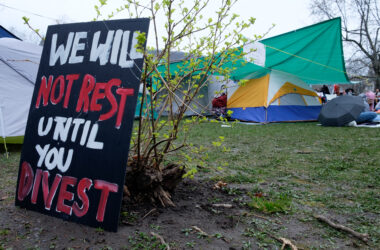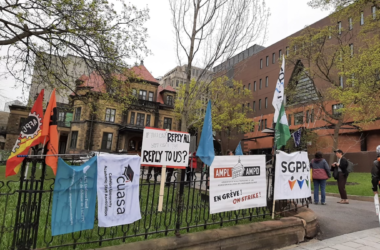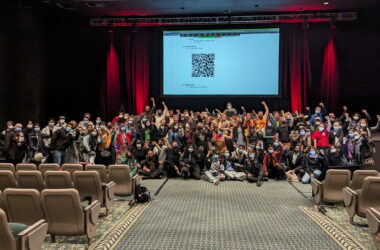 Holly Stewart
Holly Stewart Holly Stewart
Holly StewartWith his easy charm and boyish grin, former British Prime Minister Tony Blair spoke to scholars, students, religious leaders, and MPs at the Windsor Hotel on Friday.
Blair’s visit was prompted by the Tony Blair Faith Foundation’s funding of teaching and research on religion and globalization at McGill’s Faculty of Religious Studies. Earlier that day, he led a class of the students of RELG 319: Religion and Globalization, the new course funded by the foundation.
Blair considers the issues his foundation promotes to be some of the 21st century’s most vital.
“Does religious faith become a force for progress? Or does religious faith become a source of conflict and sectarianism?” Blair asked. “I think that’s the dominant question of the 21st century.”
Finding such answers becomes more and more important as globalization accelerates, he said.
“In China you’ve got more practicing Protestants than in England, more practicing Catholics than in Italy and more Muslims than in the whole of Europe,” he said. “And then you’ve got 100 million Buddhists.”
The foundation is funding teaching and research at seven universities around the world, including Yale, the National University of Singapore, and Peking University. Blair explained that the best approach to dealing with the challenges of religion and globalization is to “establish an intellectual framework” for discussion, which can only be done at universities. Blair’s ultimate hope is to raise religious literacy and reduce prejudice.
“When you’re a Christian and you learn that Islam reveres Jesus as a prophet, it somewhat alters … your understanding of the religion,” he said. “When most people within Islam understand the debates over what the divinity of Christ is all about … it gives them a completely different framework.”
But the road to tolerance may not be so smooth. Aditya Bhattacharjce, U3 religious studies and a student in RELG 319, thought that Blair glossed over the hurdles that this dialogue has to overcome.
“I thought he was a little too idealistic,” he said. “Education seems like a big part of his Faith Foundation, and there’s often a fine line between educating people and interfering in a foreign religion’s matters.”
While he praised the merits of inter-religious dialogue, Blair said that no amount of religious understanding will dictate policy.
“You can’t go into your corner and pray to God about what minimum wage should be,” he said.
In his political career, Blair has had a variety of experience with religious issues. In 1998, he helped engineer the Good Friday Agreements, which assuaged sectarian violence in Ireland. As prime minister, he was often criticized for mentioning God in public, notably regarding his unpopular decision to go to war in Iraq. He is currently the British government’s Middle East envoy.
Even though Blair has moved on from party politics, the charm that won him elections was on full display. When interviewer Evan Solomon of the CBC asked him why his program had chosen McGill, Blair called it a “fantastic institution of learning,” prompting Solomon to quip that his political skills were “not rusty one bit.”
Xiomara Hurney-Cranston, U3 religious studies and anthropology, is taking RELG 319 and said she saw a different Tony Blair than the one she knew as prime minister.
“I have a different perspective of Tony Blair than when I thought of him just as a politician,” she said. “He has such a negative reputation for Iraq, but I think this is a very, very important initiative.”








